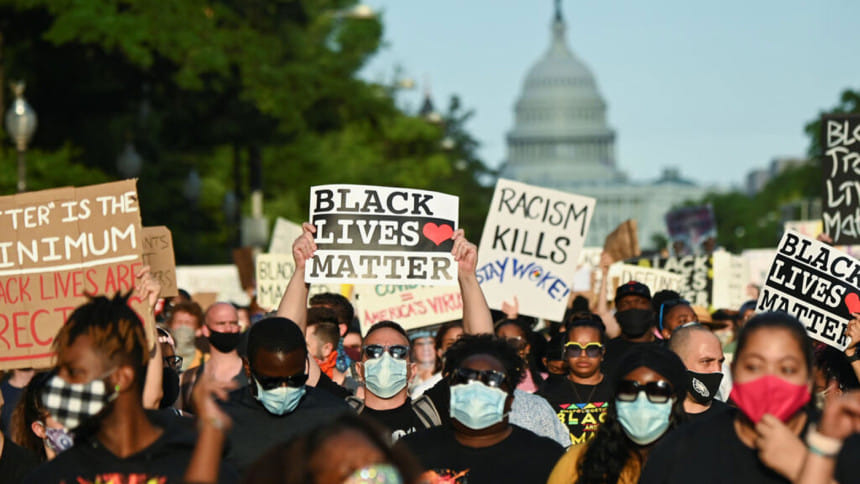Is it really different this time? Maybe

Bicharpoti tomar bichar korbe jara, aaj jegechhe shei janata! (O Judge, those that will judge you, the people, have arisen today!)
- From a Bangla song written during the anti-colonial movement in British India by leftist writer/composer Salil Chowdhury.
In the long tortuous history of the battle for the emancipation of Blacks that continues to this day in the US, progress has sometimes been so slow, and recalcitrant racist biases have been so resistant to change, that the tardy progress or lack thereof has been a cause of bitter frustration.
Then in one convulsive, historic jolt—society takes a quantum leap with a dramatic change.
Take two examples from US history: The emancipation proclamation in 1863 during the Civil War by US President Abraham Lincoln, and the passage of the Civil Rights Act and the Voting Rights Act by Congress in the 1960s, signed into law by US President Lyndon B. Johnson.
With emancipation and the defeat of the Confederacy at the end of the Civil War, Blacks experienced freedom for the first time. For a brief, golden period, they ran and won public office, enjoyed freedoms that the white majority took for granted.
Fast forward to the 1960s, when the nation was convulsed by the Civil Rights movement spearheaded by Rev. Martin Luther King, Jr. This led to the passage of landmark laws that provided federal protection against racist laws and Black vote suppression.
Yet there is a certain oddness in this progression. If emancipation had been so wonderful, how is it that nearly a century later, Blacks had to fight for civil rights all over again?
The answer lies in the deeply mixed record of the US in race relations. Just like a wave that crashes on the shore, and then quickly recedes back into the sea, convulsive jolts moving race relations forward have invariably been followed by a strong backlash that has pulled the nation back into its dark racist past. As former US President Barack Obama once drily noted on US progress: "We zig and we zag."
I remember my joy and disbelief at Obama's election. Until then, I had thought that there was no way we would see a Black elected president in our lifetime.
What a president he was! Cerebral, polished, erudite, but also warm and kind—he rightly became a darling of the world, a living, eloquent rebuttal to the vile racist stereotypes that still endure.
Today, upon reflection, I wonder if that vicious, racist US historical penchant is reasserting itself. Obama was followed by US President Donald Trump, whose record is liberally peppered with racist stances, including promoting a bogus "birther" theory that Obama was born in Kenya, slurs against Mexicans, a US judge of Mexican descent, and most recently against China.
Notice a pattern here? Progress, followed by a depressing proclivity towards racist recidivism.
What a breath of fresh air, then, to see a genuine grassroots movement blossom following the horrific racist murder of George Floyd by police. Thousands and thousands of whites joined their Black brothers and sisters to put their foot down: Enough is enough.
It really feels different this time. It's not just the demonstrations, which have been overwhelmingly peaceful and astonishingly diverse. There is a sense that somehow a spark of empathy has shot through the racial divide and caught fire.
Statues of yesteryear's racist heroes are falling. Editors at The New York Times and The Philadelphia Inquirer have quit for making a racially insensitive faux pas. Princeton University has dumped the name of US President Woodrow Wilson for its prestigious centre, acknowledging Wilson's racism.
Taking a knee, the practice of Black players kneeling by one knee to protest oppression of Blacks, used to be controversial. Now it has gone mainstream as police chiefs in several cities have done so publicly, and House Speaker Nancy Pelosi along with her Democratic members took a knee to honour George Floyd.
Corporate America is expressing support. Walmart announced a USD 100 million fund to create a centre for racial equity. Apple has pledged USD 100 million towards a racial justice initiative. Department store chain Target has pledged USD 10 million to support social justice.
What's so heartwarming it that American public opinion has moved.
"A majority of American voters support the demonstrations against police brutality and racial injustice that have roiled the country over the past month, embracing ideas about bias within the criminal justice system and the persistence of systemic racism that are central tenets of the Black Lives Matter movement, according to a new national poll of registered voters by The New York Times and Siena College," The New York Times reported.
The poll found that 52 percent of white voters believe the death of George Floyd was "part of a broader pattern of excessive police violence toward African Americans."
"The numbers add to the mounting evidence that recent protests have significantly shifted public opinion on race, creating potential political allies for a movement that was, within the past decade, dismissed as fringe and divisive," the newspaper added.
No wonder Trump is flailing so hopelessly. Trump, for all his bluster, is essentially a one-trick pony.
"While (Trump) has shown little sympathy for the protesters and their fight for racial justice, and has continued to use racist language that many have denounced, voters feel favourably toward the protests and their cause," the newspaper added.
To be sure, there is a long, long way to go. Having said that, today's movement could well be remembered as a landmark in Black progress towards equality much like the end of the US Civil War and the passage of the Civil Rights Act.
Ashfaque Swapan is a contributing editor for Siliconeer, a digital daily for South Asians in the United States.

 For all latest news, follow The Daily Star's Google News channel.
For all latest news, follow The Daily Star's Google News channel. 



Comments